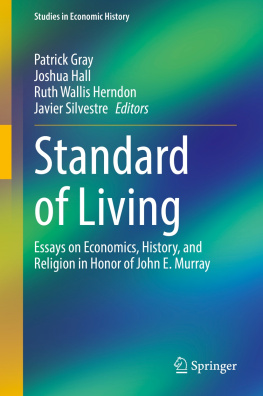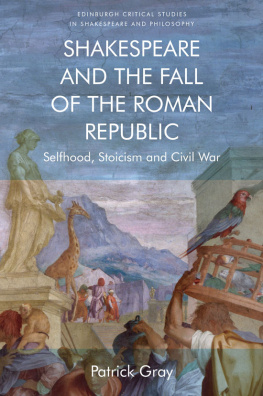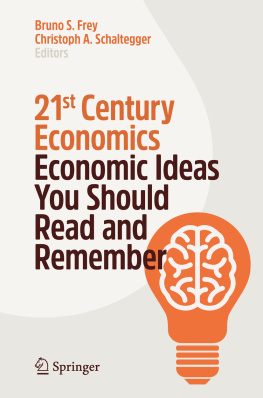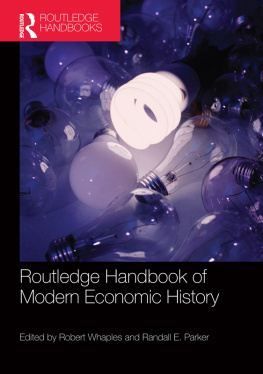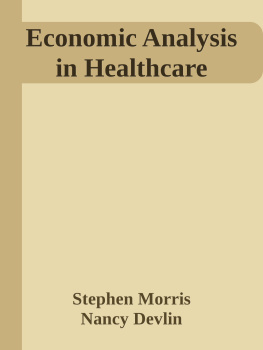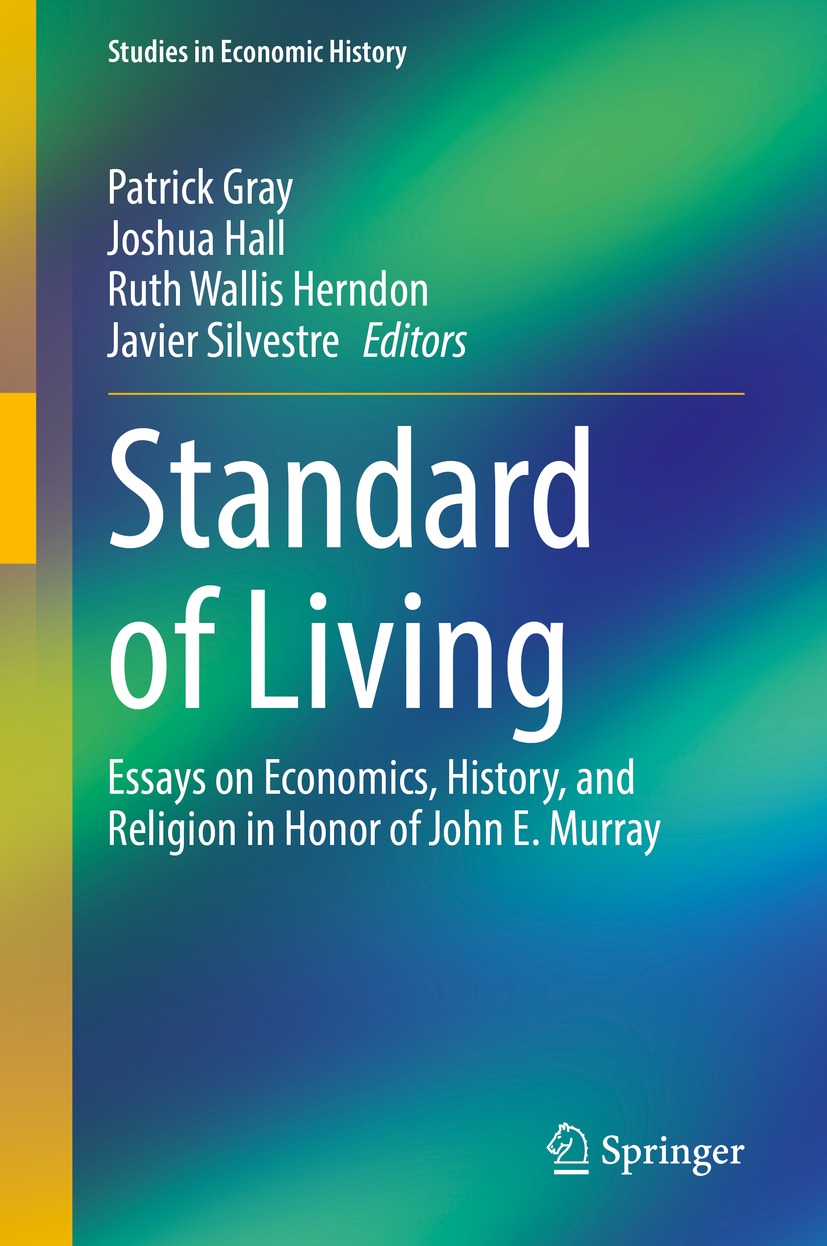Studies in Economic History
Series Editor
Tetsuji Okazaki
Faculty of Economics, The University of Tokyo, Tokyo, Japan
Aims and Scope
This series from Springer provides a platform for works in economic history that truly integrate economics and history. Books on a wide range of related topics are welcomed and encouraged, including those in macro-economic history, financial history, labor history, industrial history, agricultural history, the history of institutions and organizations, spatial economic history, law and economic history, political economic history, historical demography, and environmental history.
Economic history studies have greatly developed over the past several decades through application of economics and econometrics. Particularly in recent years, a variety of new economic theories and sophisticated econometric techniquesincluding game theory, spatial economics, and generalized method of moment (GMM)have been introduced for the great benefit of economic historians and the research community.
At the same time, a good economic history study should contribute more than just an application of economics and econometrics to past data. It raises novel research questions, proposes a new view of history, and/or provides rich documentation. This series is intended to integrate data analysis, close examination of archival works, and application of theoretical frameworks to offer new insights and even provide opportunities to rethink theories.
The purview of this new Springer series is truly global, encompassing all nations and areas of the world as well as all eras from ancient times to the present. The editorial board, who are internationally renowned leaders among economic historians, carefully evaluate and judge each manuscript, referring to reports from expert reviewers. The series publishes contributions by university professors and others well established in the academic community, as well as work deemed to be of equivalent merit.
All books and chapters in the Studies in Economic History book series are indexed in Scopus.
Editorial Board Members:
Loren Brandt (University of Toronto, Canada)
Myung Soo Cha (Yeungnam University, Korea)
Nicholas Crafts (University of Warwick, UK)
Claude Diebolt (University of Strasbourg, France)
Barry Eichengreen (University of California at Berkeley, USA)
Stanley Engerman (University of Rochester, USA)
Price V. Fishback (University of Arizona, USA)
Avner Greif (Stanford University, USA)
Tirthanker Roy (London School of Economics and Political Science, UK)
Osamu Saito (Hitotsubashi University, Japan)
Jochen Streb (University of Mannheim, Germany)
Nikolaus Wolf (Humboldt University, Germany)
(in alphabetical order)
Editors
Patrick Gray , Joshua Hall , Ruth Wallis Herndon and Javier Silvestre
Standard of Living
Essays on Economics, History, and Religion in Honor of John E. Murray

The Springer logo.
Editors
Patrick Gray
Religious Studies, Rhodes College, Memphis, TN, USA
Joshua Hall
College of Business and Economics, West Virginia University, Morgantown, WV, USA
Ruth Wallis Herndon
Department of History, Bowling Green State University, Bowling Green, OH, USA
Javier Silvestre
Applied Economics, Facultad de Economia y Empresa, Zaragoza, Spain
ISSN 2364-1797 e-ISSN 2364-1800
Studies in Economic History
ISBN 978-3-031-06476-0 e-ISBN 978-3-031-06477-7
https://doi.org/10.1007/978-3-031-06477-7
The Editor(s) (if applicable) and The Author(s), under exclusive license to Springer Nature Switzerland AG 2022
This work is subject to copyright. All rights are solely and exclusively licensed by the Publisher, whether the whole or part of the material is concerned, specifically the rights of translation, reprinting, reuse of illustrations, recitation, broadcasting, reproduction on microfilms or in any other physical way, and transmission or information storage and retrieval, electronic adaptation, computer software, or by similar or dissimilar methodology now known or hereafter developed.
The use of general descriptive names, registered names, trademarks, service marks, etc. in this publication does not imply, even in the absence of a specific statement, that such names are exempt from the relevant protective laws and regulations and therefore free for general use.
The publisher, the authors, and the editors are safe to assume that the advice and information in this book are believed to be true and accurate at the date of publication. Neither the publisher nor the authors or the editors give a warranty, expressed or implied, with respect to the material contained herein or for any errors or omissions that may have been made. The publisher remains neutral with regard to jurisdictional claims in published maps and institutional affiliations.
This Springer imprint is published by the registered company Springer Nature Switzerland AG
The registered company address is: Gewerbestrasse 11, 6330 Cham, Switzerland
Preface
John Edward Murray was the Joseph R. Hyde III Professor of Political Economy and Professor of Economics at Rhodes College in Memphis, Tennessee, when he passed away suddenly on March 27, 2018, at the age of 58.
He was born on April 9, 1959, in Cincinnati, and became the first member of his family to attend college. He worked at a variety of jobs to pay his tuition, including phlebotomist, house painter, roofer, and ice cream vendor, graduating in 1981 from Oberlin College with a degree in economics. He later added an MS in mathematics from the University of Cincinnati, and the MA and PhD in economics from The Ohio State University, where he wrote his dissertation under Rick Steckel.
John taught high school math before pursuing his graduate work in economics. After finishing at Ohio State, he accepted a position at the University of Toledo, where he remained for 18 years before accepting the Hyde Professorship at Rhodes College in 2011.
He had a lifelong penchant for learning, spending a summer studying the German language in Schwabish Hall in 1984, and summers as an NEH scholar in Munich in 1995 and at Duke in 2013.
Murray authored two books and co-edited a third. His first book, Origins of American Health Insurance: A History of Industrial Sickness Funds (Yale University Press, 2007) was named one of ten Noteworthy Books in Industrial Relations and Labor Economics in 2008 by the Industrial Relations Section, Princeton University. His second book was co-edited with Ruth Wallis Herndon and titled Children Bound to Labor: The Pauper Apprentice System in Early America (Cornell University Press, 2009). Economic History Review said it was a model for both comparative and national studies of childhood and labor in historical context. His third book, The Charleston Orphan House: Childrens Lives in the First Public Orphanage in America

